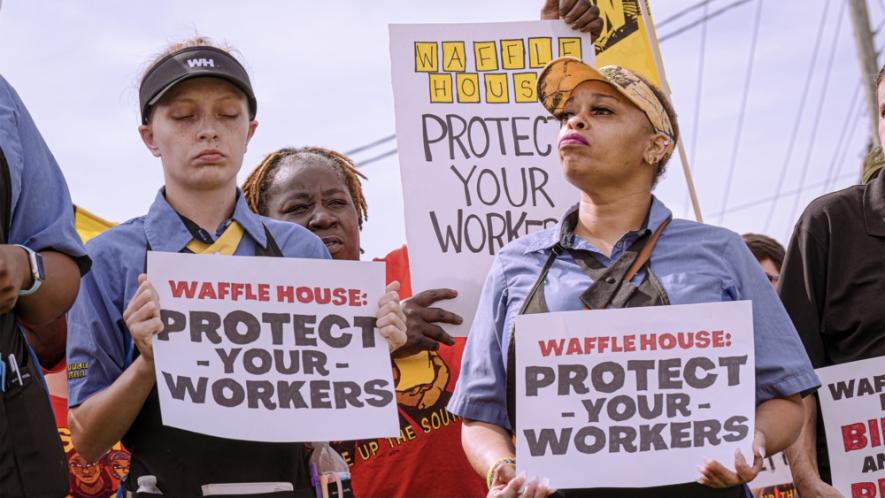Waffle House Workers Win Major Raise After Months of Campaigning

Waffle House workers rally in defense of their rights. (Photo: USSW)
US fast food giant Waffle House announced in May what it dubs the “single largest additional investment in our workforce in the entire 68-year history” of the company, rolling out raises across the country that came into effect this month.
Workers emphasize that this victory was a direct result of struggle from below. Peoples Dispatch spoke to Katie Giede, a Waffle House worker in Covington, Georgia, who has been working for the company for around ten years. Giede is a member of the Union of Southern Service Workers, a newly formed labor union which has been undertaking the project of organizing some of the most marginalized workers in the United States, workers of low-wage sectors including retail, fast food, care, and gas station workers in the US South.
According to Giede, the real reason behind Waffle House’s announcement is that “we have been applying pressure, going on strike, delivering demand letters.” Workers are “building a wall that they can’t get around.
Workers at Waffle House continue to leverage further demands of the company, including a liveable wage of USD 25 per hour, as well as 24-hour security, and an end to mandatory meal deductions, in which Waffle House deducts a “meal credit” of at least USD 3 per shift, whether or not workers eat the meal the company provides. Giede vows to continue applying pressure to the company “until we get what we deserve.”
Waffle House workers organized with USSW are urging the public to sign a petition to stand with workers and their three primary demands of the company. “We’re sick and tired of making poverty wages, the constant threat of in-store violence, and mandatory meal deductions—whether we eat a meal or not while on a shift,” the petition reads.

Katie Giede speaks at a rally with other Waffle House workers (Photo: USSW)
Waffle House has locations spread throughout the US South, a region with laws and governing bodies that are hostile to workers’ rights, which massive corporations like Waffle House often exploit for additional profit. Workers in Georgia, for example, earn a tipped minimum wage of as low as USD 3 per hour due to the “tipped minimum wage” being far lower than the federal minimum wage of USD 7.25 per hour.
With the latest announcement, servers’ wage increases will differ based on the regions where they work. For example, the wages of servers in Florida and Colorado will climb higher due to higher minimum wage laws in those states. Workers will fall into one of three categories, based on where they work, those whose base pay would reach USD 5.25 per hour in two years, USD 6.25 in two and a half years, or USD 7.25 in three years.
Workers who have been employed at the fast food chain for longer will receive certain bonuses: a 50-cent-per-hour bonus for workers working longer than three years, with an increase of ten cents per hour every additional year, maxing out at a bonus of USD 3.20 per hour after 30 years of employment. Bonuses could also include USD 1 per hour for working evenings or overnight shifts.
In an over ten-minute-long announcement video, Waffle House CEO Joe Rogers III explains the system of raises while also putting much of the credit for wage increases on the company itself. “I don’t see many others in our industry doing things like this. We need to ultimately get ready for what sort of expectations come with both rising pay and rising prices.”
“You better believe our customers are going to expect more when they pay more, and we don’t want to hurt your tip realities either,” Rogers continued.
“As a single mom, any bit of money added to my income is a help. This is definitely a small win,” Giede said. She currently makes USD 2.92 per hour under the so-called “tipped minimum wage.”
Such low wages make it “very hard to live normally,” Giede said, “because you never know from week to week, from day to day, if your tips are going to make it because your paycheck doesn’t do anything.”
For the USSW, the victory has given them more energy and confidence to continue their struggle to organize the entire South, one of the most hostile regions in the country in terms of labor legislation.
Get the latest reports & analysis with people's perspective on Protests, movements & deep analytical videos, discussions of the current affairs in your Telegram app. Subscribe to NewsClick's Telegram channel & get Real-Time updates on stories, as they get published on our website.
























